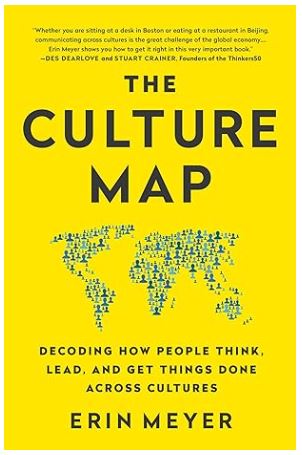The Reading Room

The Culture Map
Erin Meyer
Published: 2016, PublicAffairs
Erin Meyer’s “The Culture Map” explores how cultural differences shape business interactions, emphasizing the critical role of effective communication. The book is structured around eight cultural scales: communication, evaluation, persuasion, leadership, decision making, trust, disagreement, and scheduling. Each scale provides a framework for navigating the complexities of cross-cultural communication.
At first glance, some readers might notice a generational gap in Meyer’s approach, as the book includes broad generalisations about cultures that may not resonate with everyone, particularly those who are more attuned to modern, inclusive perspectives. However, setting aside these generalisations, the book offers interesting insights. Meyer, an American professional with extensive international experience, brings a wealth of knowledge to the table. Her anecdotes and examples from various cultures enrich the narrative, making it more than just a theoretical guide.
While some of the content might seem like common sense to those with a degree of emotional intelligence—such as adapting communication styles and recognizing that some cultures are more direct than others—there are subtler points about high-context and low-context cultures that add valuable insight.
Mixing high-context and low-context communication can lead to confusion and unintended offence. In high-context environments, there is an assumption of shared understanding, where what is not said is as important as what is said. In contrast, low-context cultures assume that people say exactly what they mean, leaving no room for misunderstanding. Therefore, it’s crucial for people from these differing communication styles to be aware of these differences when interacting.
Another concept discussed in detail is FACE, often associated with Asian cultures but in practice is a global phenomenon. FACE refers to the importance of maintaining one’s reputation, dignity, and honour in social interactions. In many Asian cultures, FACE is deeply ingrained and can influence business negotiations, conflict resolution, and everyday interactions. Losing FACE can have significant social and professional repercussions, leading to a strong emphasis on harmony and indirect communication to avoid causing embarrassment or shame. However, the concept of FACE is not limited to Asia. In Western cultures, an individual often refers to one’s reputation. The underlying principle remains the same: preserving one’s self-esteem and social standing.
Throughout the book, Meyer covers the eight cultural scales, summarised below:
- Adapt Communication Styles: Direct vs. Indirect
- Tailor Feedback Approaches: Direct Negative Feedback vs. Subtle
- Persuasion Techniques: Principles and Theories vs. Practical Examples and Applications
- Leadership Styles: Hierarchical vs. Egalitarian
- Decision-Making Processes: Team vs. Top-Down
- Building Trust: Task-based vs. Relationship-based
- Handling Disagreements: Public Confrontation vs. Managed Disagreements
- Scheduling and Time Management: Strict Schedules vs. Willingness to Wait
Meyer’s insights provide a practical guide for anyone involved in a global company or working in multicultural environments.
October 2024
The information contained above and in other entries in the Ocean Dial Book Review Series is intended for general information and entertainment purposes only, and should not be relied upon in making, or refraining from making, any investment decisions. No information provided herein should or can be taken to constitute any form of advice or recommendation as to the merits of any investment decision. You should take independent advice from a suitably qualified investment adviser before making any investment decisions.
Chip War – The Fight for the World’s Most Critical Technology
Published: 2022, Simon & Schuster
Power in the modern world – military, economic, geopolitical – is built on a foundation of computer chips. America has maintained its lead as a superpower because it has dominated advances in computer chips and all the technology that chips have enabled. Now that edge is in danger of slipping, undermined by the naïve assumption that globalising the chip industry and letting players in Taiwan, Korea and Europe take over manufacturing serves America’s interests.
Poor Charlie’s Almanack: The Essential Wit and Wisdom of Charles T. Munger
Published: 2023, Stripe Press
From 1733 to 1758, Benjamin Franklin, the Founding Father of the United States of America, dispensed useful and timeless advice through his book Poor Richard’s Almanack (“Poor Richard” being the pseudonym adopted by Benjamin Franklin for this purpose). Among the virtues extolled were thrift, duty, hard work, and simplicity. Then some two and fifty hundred years later Charlie Munger stepped forth with Poor Charlie’s Almanack, a collection of speeches and talks by Charlie Munger first published in 2005.
The Ride of a Lifetime
Published: 2019, Transworld Publishers
Robert Iger became CEO of The Walt Disney Company in 2005, during a difficult time. Competition was more intense than ever and technology was changing faster than at any time in the company’s history.


